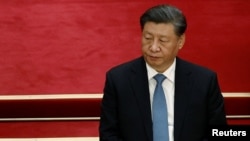Public remarks from senior Chinese leaders, delivered during the annual meeting of the National People's Congress, which began Sunday, suggest that Chinese leader Xi Jinping and the Communist Party that he controls are adopting a more confrontational approach to dealing with the United States.
Speaking to senior political leaders on Monday, Xi appeared to blame his country's recent economic struggles on "comprehensive containment and suppression by Western countries led by the U.S. over the past few years, which have brought unprecedented and severe challenges for China's development."
The U.S. has repeatedly denied that it is seeking to slow China's growth, saying that it seeks only to impose "guardrails" that will prevent competition between the world's two largest economies from turning into conflict.
Less than 24 hours after Xi's remarks, Qin Gang, who took over as China's foreign minister in December, also criticized the U.S. approach toward China. "If the United States does not hit the brakes but continues to speed down the wrong path, no amount of guardrails can prevent derailing, and there will surely be conflict and confrontation," he said.
In a press conference on Tuesday, State Department spokesperson Ned Price reiterated the U.S. case, saying, "This is not about containing China. This is not about suppressing China. This is not about holding China back. This is about upholding the rules-based order."
Deteriorating relations
The comments from Beijing come at a low point in U.S.-China relations. Last month, the U.S. Air Force tracked and ultimately shot down what officials identified as a Chinese espionage balloon that traversed the U.S. mainland. In response, Secretary of State Antony Blinken canceled a trip to China that had been seen as an opportunity to shore up the frayed bilateral relationship.
Earlier this year, the House of Representatives established the Select Committee on the Strategic Competition Between the United States and the Chinese Communist Party. Last week, the committee held a prime-time hearing titled "The Chinese Communist Party's Threat to America." The committee plans to hold a series of such meetings during the coming year.
Blinken has also been warning China of adverse consequences if it decides to intervene in the ongoing Ukraine conflict by supplying weapons to Russia, which began the war by invading its neighbor in February 2022.
In his remarks Tuesday, Qin said that China had no plans to supply Russia with arms, but that it was inappropriate for the U.S. to be dictating to China on the subject, given that the U.S. regularly supplies arms to Taiwan, the self-governing island in the China Sea that Beijing claims as part of its territory.
"Why does the U.S. ask China not to provide weapons to Russia while it keeps selling arms to Taiwan?" Qin demanded.
Qin said that in an "unstable" world, the relationship between Russia and China, which share a border more than 4,000 kilometers long, should be emulated.
"China and Russia have found a path of major country relations featuring strategic trust and good neighborliness, setting a good example for international relations," he said.
Experts divided
Experts who spoke with VOA differed as to whether the comments made by Xi and Qin reflect a substantial change in China's position toward the U.S.
"I think Xi is taking a harder line, likely because there doesn't seem to be much hope of improving U.S.-China ties in the near future, so it may be that he sees little downside in making these accusations," said Zack Cooper, a senior fellow at the American Enterprise Institute.
"I think China is trying to take a hard line on the United States and a slightly more conciliatory approach elsewhere," Cooper said. "This will likely work better in the Global South than it will with U.S. allies in Europe and Asia."
Sending a warning
Zuri Linetsky, a research fellow with the Eurasia Group Foundation, told VOA that he wasn't sure the Chinese leaders' comments actually reflected much of a change.
"I'm not convinced that it's actually a step up in the rhetoric," he said. "The context really matters, and this isn't happening in a vacuum."
Linetsky said that the comments, particularly those by Qin, come during a time of heightened tension, when China feels compelled to respond to what it sees as provocations by the U.S. He likened it to a brushback pitch in baseball: an inside pitch serving as a warning that the batter is standing too close to home plate.
"This is the sharpest point that a Chinese official has made, but it's not clear that this is a Chinese escalation," he said, pointing out that in the same set of remarks, Qin reaffirmed China's desire to settle the issue of Taiwan peacefully.
Economic struggles
Xi's comments blaming the U.S. for putting economic pressure on China come as his country struggles to emerge from an economic slowdown.
The U.S. has placed escalating economic pressure on China in recent years. During the presidency of Donald Trump, the U.S. imposed sweeping new tariffs on Chinese goods coming into the U.S., most of which remain in effect today.
The U.S. has also taken aggressive steps against Chinese companies seen to be acting as arms of the country's security services, such as telecom giant Huawei. More recently, the U.S. has barred the transfer of advanced semiconductors to China, using export control laws to bar not just U.S. firms but also international companies that use U.S. technology in their products from selling in the Chinese market.
Several experts told VOA, however, that China's economic struggles are a product of Beijing's own policies and actions.
"Growth is lower than it's been, but I don't think it has much to do with U.S. policy," Ian Johnson, a senior fellow for China studies at the Council on Foreign Relations, told VOA. "It's primarily homegrown. The chickens are coming home to roost after a decade of throttling the private sector and pouring money into the less efficient state sector and the construction industry, which is a recipe for slower growth. That, along with demographic issues, is pushing the Chinese economy lower."
Domestic causes for slowdown
The Chinese economy grew at a rate of just 3% in 2022, less than half of the 2021 rate, a phenomenon driven in large part by the country's long adherence to a strict anti-COVID-19 policy marked by lengthy citywide lockdowns, mass testing and quarantines.
Unlike many Western nations, China did not implement a nationwide vaccination campaign taking advantage of effective new vaccines. Instead, it ended up leaving much of its population vulnerable to the disease when its leaders abruptly ended the policy in December.
Since then, the Chinese economy has shown signs of a forceful rebound. The country, however, is still burdened with a massively over-leveraged real estate sector as well as a banking sector full of institutions with debilitating levels of bad loans on their books.
"Xi is facing the classic dictator's dilemma," Craig Singleton, director of the China Program at the Foundation for Defense of Democracies, told VOA. "His aggressive, counterproductive policies have adversely impacted China's economic growth and alienated key constituencies around the world. Facing these and other challenges, Xi must now deflect responsibility for these failures by blaming them on hostile external forces."
Jie Xi, of VOA's Mandarin Service, contributed to this story.














